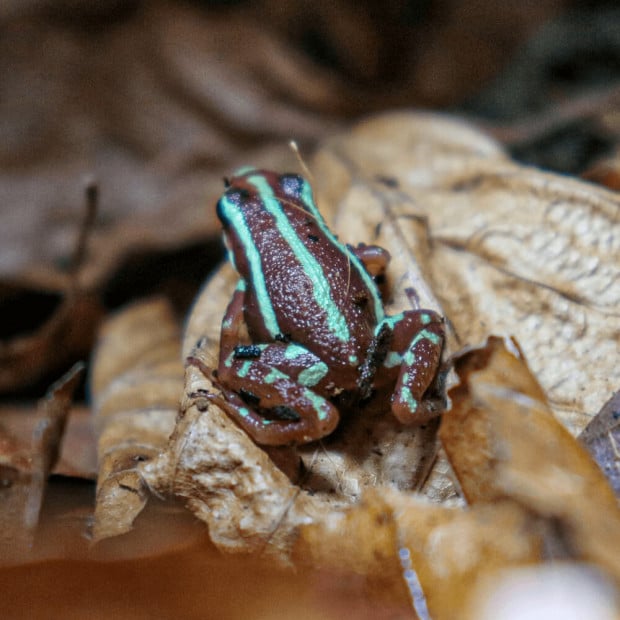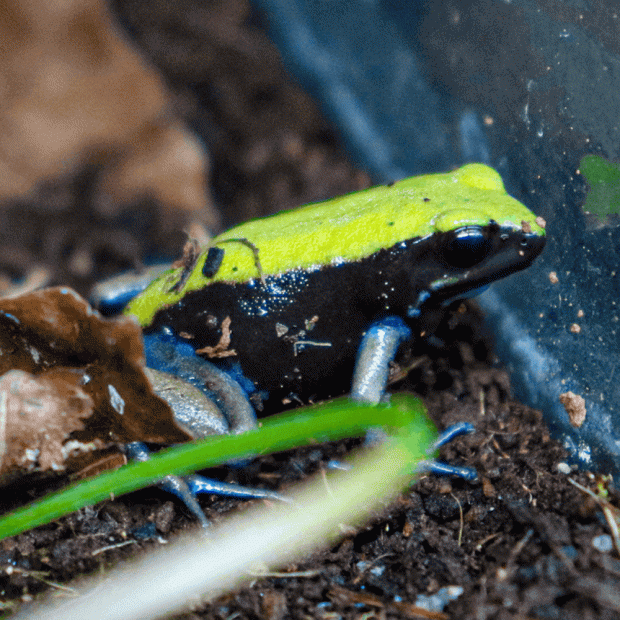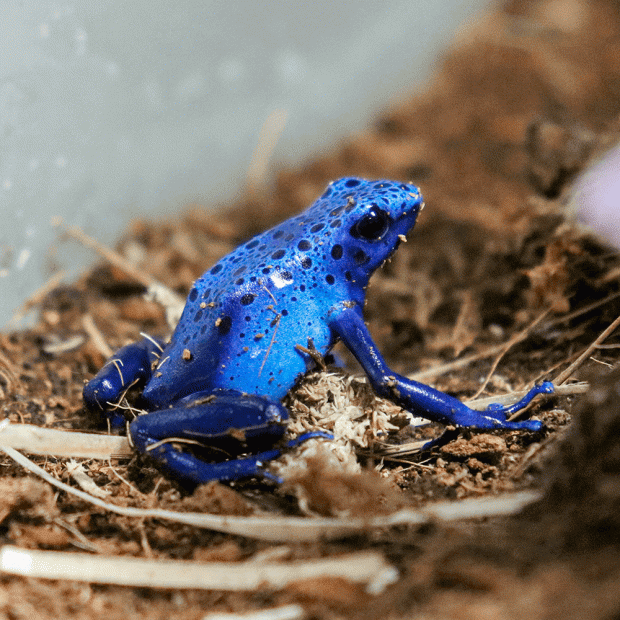- Blue-legged mantella are not a bad choice for beginners
- Opportunity to create a stunning display enclosure
- Beautiful colourations and active personalities
Do Blue-legged mantella make good pets?
The Blue-legged mantella is a colourful and stunning species of frog endemic to the Isalo Massif in Madagascar. They are diurnal and quite active so make great display animals, making them extremely popular in the pet trade, although they tend to be a little timid when you go into the enclosure for maintenance.
In nature, this is a threatened species within the endangered bracket, their main threat being habitat loss, and other threats including over-collection for the pet trade, as they are actively sought out by poachers, with several thousand specimens being collected annually.
Blue-legged mantella prefer open, sunny areas such as temporary seasonal streams or temporary pools, as well as narrow gallery forest, wet canyons and rocky regions close to water. Their striking colouration is a form of aposematism, meaning it is a warning to potential predators of their toxicity which is lost in captivity due to dietary changes, similar to other Mantella species.
At Swell Reptiles, all of our Blue-legged mantella were captive bred in the UK, meaning you can rest assured that getting your new pet caused minimal negative impacts on their native populations, whilst dramatically reducing the risk of parasitism and disease.
Which enclosure should I choose for my Blue-legged mantella?
Blue-legged mantella have high humidity requirements (70-80%), so are best kept in glass or PVC enclosures as wooden vivariums are likely to warp and become damaged in the consistent moisture. We recommend a minimum enclosure size of 60 x 45 x 45cm (24 x 18 x 18”) for 3-4 adult Blue-legged mantella, such as the Exo Terra Glass Terrarium 60x45x45cm.
Do Blue-legged mantella need to be heated?
Like Dart frogs, Blue-legged mantella are not very tolerant of high temperatures, rather they do better with a warm area no hotter than 26°C (78°F) and cooler areas between 15-18°C (59-64°F). Depending on the temperature of your home, extra heating may not be needed, but if it is, a heat mat stuck up the side or back of the terrarium and attached to a mat stat will do the trick.
Do Blue-legged mantella need UVB?
Blue-legged mantella do best with a low-level UVB, giving them a UVI between 1-2. This is usually achieved using an Arcadia ShadeDweller ProT5 Kit placed between 25-40cm (10-15”) above the basking zone, or an Arcadia ProT5 Kit - Forest 6% positioned between 40-45cm (15-18”) above the basking zone.
How can I maintain the humidity for my Blue-legged mantella?
To begin with, a loose, moisture-retaining substrate should be used, for example coco soil or Arcadia EarthMix if you would like to add live plants. The substrate layer should then be topped with mosses such as Sphagnum moss, Carpet or Cushion Moss which helps to raise humidity levels whilst enhancing the overall look of the enclosure.
You may also wish to add a drainage layer of Hydro Rocks and Hydro Matting before adding the substrate, which is particularly important for live planted set-ups as it will prevent the soil from becoming water-logged, protecting the roots of your plants. This layer can also act as a water reservoir, wicking water back up into the substrate as it begins to dry out so it is still worth doing even in non-bioactive set-ups.
Substrate and a drainage layer alone is unlikely to maintain the required humidity levels without the regular addition of moisture. This can be done manually with a hand-held spray bottle, or using an automatic fogger or rain system, both of which are particularly helpful if you need to be away from your Blue-legged mantella when going to work for example.
Blue-legged mantella are not great swimmers, so although a water dish is essential, it should not be deep enough to submerge the frog fully, or at least should not be filled deep enough for this. All water provided to your Blue-legged mantella must be treated with a dechlorinator as chlorine is harmful to them, although if you can provide RO water, this is even better.
How do I decorate a Blue-legged mantella terrarium?
Blue-legged mantella are ideal candidates for a heavily planted bioactive terrarium, as their husbandry requirements are ideal for many tropical plants. Not only will this create a beautiful display, but it will provide these shy frogs with lots of cover to help them feel secure. Artificial plants can still be used, however, if live plants aren’t your thing. Other pieces of decor such as hiding caves, cork bark, logs and leaf litter should also be considered.
What do Blue-legged mantella eat?
Your Blue-legged mantella are insectivores and feed primarily on live fruit flies and live springtails. All livefood offered to your mantella should be dusted with supplements to ensure all of the required nutrients are provided. We recommend using a calcium-rich multivitamin on every feed, such as Arcadia EarthPro-A, a calcium plus magnesium supplement on every fourth feed, such as Arcadia CalciumPro Mg and finally, a vitamin D3 supplement on every eighth feed such as Arcadia EarthPro RevitaliseD3 and finally, a vitamin a reptile supplement on every 12th feed, which is particularly important for most amphibians.
Can I Handle my Blue-legged mantella?
Like all amphibians, Blue-legged mantella have a semi-permeable skin membrane which they absorb water and other substances over. Our skin is often contaminated with a number of substances from salts to oils, all of which can cause discomfort to your frog when handled, so handling should be avoided wherever possible. If you do need to handle your Blue-legged mantella, perhaps to rehouse them, this should be done using clean and damp hands, or even using clean gloves.
How do I buy a Blue-legged mantella?
We do not ship livestock, so if you would like to purchase one of our UK captive bred Blue-legged mantella, please come into our store and see us.
To ensure all animals that pass through Swell Reptiles go to suitable homes, we will ask you a few quick questions and also to see some images of your set-up, which should be completely ready for the frog(s) to go into. We reserve the right to refuse adoption to anyone we feel is unprepared to adopt.
| Common names | Blue-legged mantella |
| Scientific name | Mantella expectata |
| Country | Madagascar |
| Captive-bred | Yes |
| Adult size | 2-3cm (0.7-1.1”) |
| Natural habitat | Temporary streams, temporary pools, narrow gallery forest, open canyons and rocks near water |
| Housing | 60 x 45 x 45cm (24 x 18 x 18”) |
| Ideal temperature | 24°C (75°F) (warm end); 18°C (64°F) (cool end) |
| UVI | 1-2 |
| Ideal humidity | 70-80% |
| Diet | Insectivorous |
| Average lifespan | 10-12 years |
| Personality | Timid |
| Ease of handling | Handling should be avoided |
| Cohabitable | Yes |
-
 Phantasmal dart frogs, Epipedobates tricolorFrom £40.00Out of stock
Phantasmal dart frogs, Epipedobates tricolorFrom £40.00Out of stock -
 Green mantella, Mantella viridisFrom £70.00Out of stock
Green mantella, Mantella viridisFrom £70.00Out of stock -
 Blue azureus dart frogs, Dendrobates tinctorius azureusFrom £90.00Out of stock
Blue azureus dart frogs, Dendrobates tinctorius azureusFrom £90.00Out of stock -
 Orange splashback dart frog, Adelphobates galactonotus 'orange'From £120.00Out of stock
Orange splashback dart frog, Adelphobates galactonotus 'orange'From £120.00Out of stock






